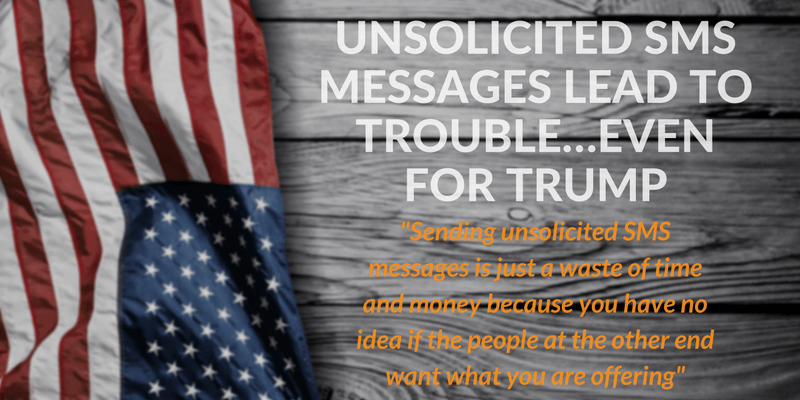Hefty fines for companies not following opt in SMS messaging policies
 Last week, in my Can you send anyone a text message? post I talked about the best practices of getting a documented opt in before sending a SMS marketing message. After that post went live, there was an announcement in the US that the large telecommunications company Sprint was fined for violating the US regulations against spam texting. Not being able to resist such a great example of what not to do, I decided to share some of the details of the Sprint case as well as a UK example to prove the point.
Last week, in my Can you send anyone a text message? post I talked about the best practices of getting a documented opt in before sending a SMS marketing message. After that post went live, there was an announcement in the US that the large telecommunications company Sprint was fined for violating the US regulations against spam texting. Not being able to resist such a great example of what not to do, I decided to share some of the details of the Sprint case as well as a UK example to prove the point.
The US Federal Communications Commission fined Sprint $7.5 million (£4.4 million) for sending text messages to those who had requested not to receive them. The people Sprint contacted had specifically opted out of receiving messages. The fine is so large because this isn’t Sprint’s first offence. Back in 2011 the company paid $400,000 ( £237k) in a settlement over similar complaints.
After this latest incident, Sprint is also required to create a compliance program and report regularly to the FCC to ensure there are no more violations for a period of two years.
It’s pretty clear the company wasn’t trying to violate anyone’s privacy or right to refuse communications. They certainly were at fault, but the error was in their processes and software used for compliance. The new compliance program they are creating should solve their problems (or they’ll be in bigger trouble next time).
That isn’t always the case though. Sometimes companies are operating with dubious intentions. That is, they knowingly spam people with text messages. At least it appears that way.
Last December First Financial (UK) Limited was issued a monetary penalty by the Information Commissioner of the Privacy and Electronic Communications. First Financial hadn’t been registered very long, didn’t completely fill out their company records, and sent text messages to over 4000 people that never requested them. In fact, the full Monetary Penalty Notice asserts that the company operated using unregistered SIM cards in an attempt to circumvent spam filters (a well known practice to those who attempt to avoid regulations). The text messages were designed to appear as if they were from friends, or people they knew, with links encouraging the receiver to apply for loans. In addition to being deceptive in nature, the messages were sent at odd hours of the day disrupting the recipients and causing distress for many.
Given the nature of the business , the number of complaints received, along with a list of other criteria, the Information Commissioner imposed a fine of £175k. It seems clear their intent was to violate the law until they were caught. The First Financial websites referred to in the complaint are no longer active.
As these two examples show, violations of the opt in requirement can be inadvertent or deliberate. Inadvertent violations can stem from being unaware of the regulations, or errors in process such as with Sprint. To avoid this type of problem you need to ensure a clear, documented opt in process for your company. And also be sure to honour those who opt out according to the process you put in place.
While the fines are expensive, the customer relations issue resulting from texting those who don’t opt in could be even more costly. At least if you’re a reputable company working hard for your customers business.
Sprint is a large company and probably won’t see any impact at all from the most recent fine (other than the improvement in their internal processes). In the States it wasn’t big news, just another headline among many.
But for smaller businesses the loss could be much greater, and perhaps financially crippling. So just remember the answer to the question, “Can I text anyone marketing messages?” is a resounding no if you don’t have their express permission.
Related Articles
SMS Marketing Disasters – and How to Avoid Them
SMS Marketing, also known as test message marketing, is one of today's most powerful and cost efficient marketing tools when used correctly and offers endless opportunities with a little creativity added to the mix. However, whether careless or intentional, some mistakes can be harmful to your brand and reputation - as well as leaving you in legal trouble in certain circumstances. Luckily, this is extremely rare and it is easy to stay safe and make sure your SMS Marketing is an all round success. In this article, we look at come examples of how not to do things and offer our advice for ensuring your campaigns are effective and profitable.
Unsolicited SMS Messages Lead to Trouble…Even for Trump
Late last month reports surfaced that the Trump US presidential campaign had sent unsolicited SMS messages to voters in the Chicago area. One man, Joshua Thorne, and his lawyers have filed a class-action lawsuit alleging the Trump Campaign violated the Telephone Consumer Protection Act (TCPA, the US equivalent of the PECR).
The price for being funny in an SMS message
Hefty fines for companies not following opt in SMS messaging policies
5 Common Questions About SMS Marketing Compliance
Electronic marketing is a tricky thing. There are rules and regulations you need to follow, and it can all seem pretty intimidating at first. To help you get started, I’ve gathered five of the most commonly asked questions about SMS marketing and the regulations and summed them up here.
SMS Marketing Compliance and The New GDPR Regulations
As with anything in business, there are rules and regulations that need to be followed. Some of the key ones are laid out in the UK Privacy and Electronic Communications Regulation (PECR) - and while this can seem like a daunting document at first, it doesn't need to be...
What You Can Learn About SMS Marketing from These 7 Companies
The Information Commissioner’s Office (ICO) issued seven monetary penalties against companies this year. We’ve read through them all – so you don’t have to – and discovered two lessons every company should learn about SMS marketing if they want to be successful.
Our 10 Best SMS Mobile Marketing Blog Posts
Need to know all about mobile marketing with SMS messaging? We’ve pulled together the top ten blog posts that tell you everything you need to know. The list starts with the basics and goes through analysing the success of your campaign.
ICO issues a huge fine for massive illegal SMS campaign
ICO, the Information Commissioner's Office, has recently imposed a huge fine on direct marketing company Help Direct UK for sending illegal SMS messages.












